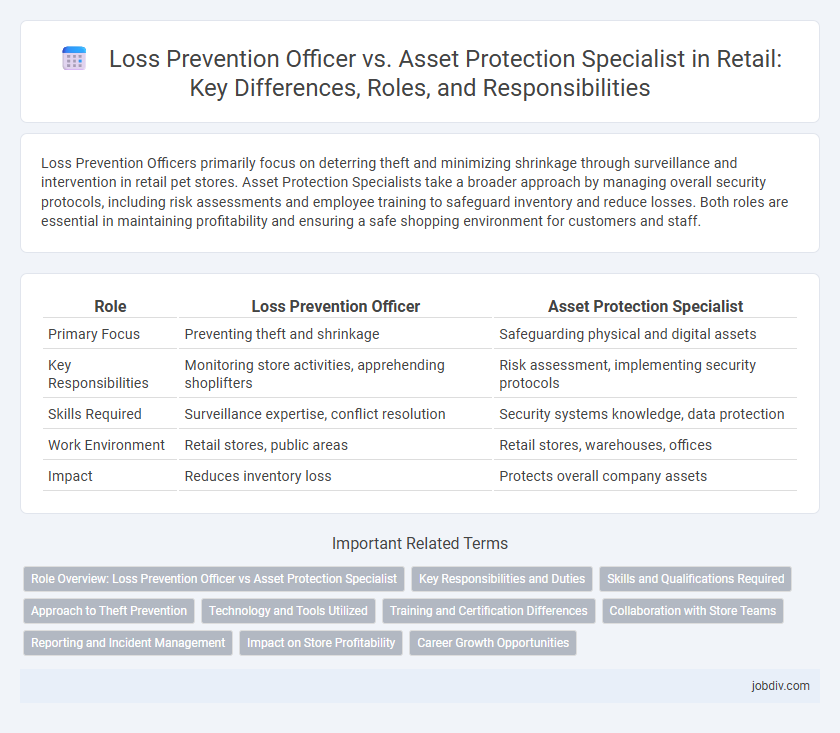Loss Prevention Officers primarily focus on deterring theft and minimizing shrinkage through surveillance and intervention in retail pet stores. Asset Protection Specialists take a broader approach by managing overall security protocols, including risk assessments and employee training to safeguard inventory and reduce losses. Both roles are essential in maintaining profitability and ensuring a safe shopping environment for customers and staff.
Table of Comparison
| Role | Loss Prevention Officer | Asset Protection Specialist |
|---|---|---|
| Primary Focus | Preventing theft and shrinkage | Safeguarding physical and digital assets |
| Key Responsibilities | Monitoring store activities, apprehending shoplifters | Risk assessment, implementing security protocols |
| Skills Required | Surveillance expertise, conflict resolution | Security systems knowledge, data protection |
| Work Environment | Retail stores, public areas | Retail stores, warehouses, offices |
| Impact | Reduces inventory loss | Protects overall company assets |
Role Overview: Loss Prevention Officer vs Asset Protection Specialist
Loss Prevention Officers primarily focus on preventing theft, reducing shrinkage, and ensuring compliance with company policies through surveillance and intervention in retail settings. Asset Protection Specialists expand this role by integrating risk management strategies, conducting detailed investigations, and collaborating with law enforcement to protect overall store assets and enhance safety protocols. Both positions play crucial roles in minimizing retail losses, but Asset Protection Specialists typically handle broader responsibilities beyond immediate loss prevention.
Key Responsibilities and Duties
Loss Prevention Officers primarily focus on monitoring store premises, conducting surveillance, and investigating theft or fraudulent activities to minimize shrinkage. Asset Protection Specialists emphasize developing and implementing security policies, training staff on safety protocols, and managing technology systems such as CCTV and alarm platforms to safeguard retail assets. Both roles collaborate closely with law enforcement and internal teams to ensure compliance with company standards and enhance overall retail security.
Skills and Qualifications Required
Loss Prevention Officers require strong observational skills, knowledge of security technology, and the ability to handle conflict effectively, often holding certifications in security or law enforcement training. Asset Protection Specialists must possess expertise in risk assessment, inventory control, and compliance regulations, alongside proficiency in implementing loss prevention strategies and conducting thorough investigations. Both roles demand excellent communication skills, attention to detail, and experience in retail or security environments to mitigate theft and protect company assets.
Approach to Theft Prevention
Loss Prevention Officers focus on deterring theft through visible monitoring, surveillance, and intervention techniques that directly address suspicious activities in retail environments. Asset Protection Specialists employ a comprehensive strategy combining technology such as RFID tagging, data analytics, and employee training programs to safeguard inventory and reduce shrinkage. Both roles emphasize proactive measures but differ in execution, with Loss Prevention Officers prioritizing immediate response and Asset Protection Specialists integrating long-term prevention systems.
Technology and Tools Utilized
Loss Prevention Officers utilize advanced surveillance systems, such as CCTV and electronic article surveillance (EAS), to detect and prevent theft in retail environments. Asset Protection Specialists incorporate integrated security software platforms, RFID tagging, and real-time data analytics to monitor inventory and enhance theft deterrence strategies. Both roles leverage technology to minimize shrinkage and improve operational security in retail stores.
Training and Certification Differences
Loss Prevention Officers typically receive foundational training in theft deterrence, surveillance techniques, and basic incident response, often completing certifications such as the Certified Loss Prevention Professional (CLPP). Asset Protection Specialists undergo more comprehensive training that includes advanced risk management, forensic analysis, and compliance protocols, frequently obtaining certifications like the Certified Asset Protection Specialist (CAPS). These differences in training and certification reflect the broader scope of responsibilities handled by Asset Protection Specialists compared to Loss Prevention Officers.
Collaboration with Store Teams
Loss Prevention Officers and Asset Protection Specialists both play critical roles in retail security, with Loss Prevention Officers primarily focusing on investigating theft and implementing security protocols, while Asset Protection Specialists emphasize preventing shrinkage through proactive monitoring and customer engagement. Collaboration with store teams involves sharing real-time information and coordinating on floor surveillance to identify suspicious behavior and deter potential theft. Effective communication and joint efforts between these roles and store staff enhance overall safety and reduce inventory loss.
Reporting and Incident Management
Loss Prevention Officers primarily focus on detailed incident reporting and maintaining comprehensive records of theft, fraud, and safety breaches, ensuring accurate documentation supports investigations and legal proceedings. Asset Protection Specialists emphasize proactive incident management, utilizing surveillance technology and risk assessment tools to prevent loss and quickly respond to security threats. Both roles require effective communication and collaboration with law enforcement and internal teams to safeguard retail assets and reduce shrinkage.
Impact on Store Profitability
Loss Prevention Officers focus on identifying and deterring theft through surveillance and employee training, directly reducing inventory shrinkage and improving store profitability. Asset Protection Specialists take a broader approach by implementing comprehensive security measures, including risk assessments and policy enforcement, which safeguard assets and enhance operational efficiency. Both roles contribute significantly to minimizing losses, but Asset Protection Specialists often drive higher profitability by addressing vulnerabilities beyond theft.
Career Growth Opportunities
Loss Prevention Officers often gain foundational experience in retail security, enabling progression to supervisory roles and specialized investigation positions. Asset Protection Specialists typically handle broader responsibilities including risk management and compliance, offering pathways to management and corporate security leadership. Both roles provide valuable career growth opportunities, with Asset Protection Specialists generally accessing higher-level strategic roles in retail security.
Loss Prevention Officer vs Asset Protection Specialist Infographic

 jobdiv.com
jobdiv.com